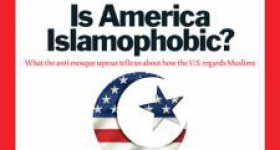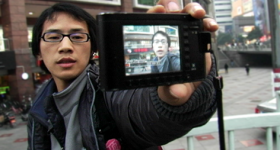Has weight weighed on your mind recently? It wouldn't be a surprise if it has. Do some channel surfing: with any given click you can watch I Used to Be Fat, Heavy, The Biggest Loser, Dance Your Ass Off, or the soon-to-premiere Shedding for the Wedding, all shows that chronicle the weight loss efforts of average citizens. While our First Lady Michelle Obama rallies to save our nation's youth from a barrage of obesity-related illnesses through physical activity and healthy eating, the inexplicably famous Kardashian sisters are shilling us diet pills which, according to US News, are simply mixtures of stimulants, laxatives, and diuretics. High blood pressure and diarrhea are apparently the new black.
Call it the fat dialectic. We teeter precariously back and forth between making sound health choices and getting skinny by any means, all in the name of weight loss. Or, we publicly declare an obesity epidemic while championing body acceptance and diversity of size. As much as we like to profess that dropping pounds is all about health, most of us occupy worlds where the social trumps the physiological, where we equate thinness with an image of success and acceptance. Somehow, looking skinny at your next family function, high school reunion, or friend’s wedding is far more pertinent than lowering your LDL cholesterol.
But when culture is thrown into the mix, sometimes the dividing line in that healthy/unhealthy dichotomy becomes even blurrier, making it more difficult for certain groups to be part of this national discussion on weight. Take Asian American communities. What if a “healthy body” means something entirely different to your family than others? What if people of your race or ethnicity are thought to be homogeneous on all levels, including body type? What are the dangers of popular assumptions that your racial/ethnic group has virtually no overweight individuals, no issues with body image, and no cases of eating disorders? Did you know that the Model Minority Myth is so pervasive, that it can actually be applied to the size of one’s ass?
Hyphen has explored these questions recently, ranging from blogger Catherine Shu’s personal experience as a size 8 woman in Asia, the significance of contestant Ada Wong on The Biggest Loser, and a first person essay by our publisher Lisa Lee on Asian American body image and her experience at a Taiwanese weight loss camp in her teens, published in the New Legacy issue of our magazine.
Lee’s article caught the attention of NPR where she appeared on Tell Me More with Michel Martin. When actress Lynn Chen (Saving Face, The People I’ve Slept With) heard the interview, she knew she had found a potential collaborator. When she’s not on set Chen runs the The Actor’s Diet blog, which we spotlighted back in 2009. The actress, having had her own experience with eating disorders and the discovery that there is a lack of resources for Asian Americans seeking help, reached out to Lee and together they have launched Thick Dumpling Skin, a blog devoted to creating “a vibrant community for Asian Americans to share and discuss our unhealthy quest, past and present, for the ‘perfect’ body.”
The blog’s assertion that “Our struggles with food and body image are not merely about will power -- they’re social, cultural, and familial” indicates that this project is taking a comprehensive look at Asian American body image issues, both dismantling the persistent preconceived notions of Asian Americans and examining the cultural dynamics that stem from within Asian American communities. To outsiders, we were all born the same. We are who we are because of biology, whether it’s as possessors of preternatural mathematic ability, tireless work ethic, or frames so petite they might as well as be Lilliputian. From the inner circles of our families, ethnic communities, peers and friends, the value of our appearance may be overinflated to a point where it becomes synonymous with success, and the bar for which we gauge attractiveness is set at an impossible standard. From one direction the message reads: “If you are Asian, you are thin.” From the other direction: “If you are Asian, you better be thin.”
It seems very difficult to find breathing room between these two poles, where differing body sizes, mental health, eating disorders, self-esteem, coping mechanisms, class, popular media, race, family background, sexuality, and relationships can all be mined for the purpose of getting to a place where we can accept who are.
But with Thick Dumpling Skin, it may become less of a battle to get these discussions going.
Though still in its nascent stage, the blog is currently accepting questions and stories (essays, poems, videos, etc.) from readers to share, and visitors are also able to comment on posts. Asian Americans may not be on the forefront of peoples’ minds when health, mind and body issues are concerned, but we're known for mobilizing -- and getting loud -- when our voices are neglected.
Check out Thick Dumpling Skin to see how you can become a part of this community and also take note of their list of eating and body image-related resources.










Comments